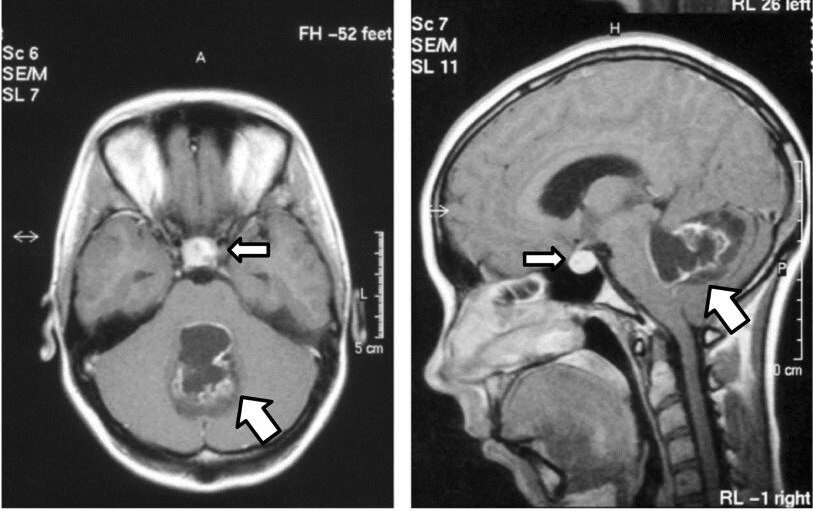Playlist
Show Playlist
Hide Playlist
Hyperprolactinemia: Causes and Management
-
Slides ProlactinandPituitaryDisorders ReproductiveEndocrinology.pdf
-
Download Lecture Overview
00:00 Hello. In this lecture, I’d like to discuss galactorrhea and hyperprolactonemia. These are often quizzed on the USMLE so pay close attention. First, I’d like to remind you of the anatomy of the pituitary gland. Remember, there’s an anterior pituitary and a posterior pituitary. They receive input from the hypothalamus that you see here. The hypothalamus actually gives input to the anterior pituitary. There, there are specialized cells that make tropic hormones that actually go to the end organ. 00:40 The end organ makes different hormones that you’ll see here. And now let’s review in detail the different types of hormones. The somatotrophs make growth hormone. This actually has a direct action on growth and metabolism. Lactotrophs or mammotrophs make prolactin. We’ll be concentrating on these during this lecture. Remember that prolactin stimulates milk production and inhibit gonadotropins. Corticotrophs make ACTH. ACTH simulates the glucocorticoids and sex steroids in the adrenal cortex. The thyrotrophs produce TSH. TSH acts on the thyroid gland. 01:27 The thyroid gland makes T4 and T3, which regulates metabolism. The gonadotrophs make FSH and LH. 01:37 In females, FSH promotes follicular development and stimulates aromatase expression and inhibin secretion. Also, LH stimulates the synthesis of steroid hormones in the theca interna and is responsible for maintaining the corpus luteum. Let’s now review what prolactin does physiologically. 01:59 It’s primary role is to prepare the breasts for lactation in the postpartum period. However, in other animals, it’s been implicated in osmoregulation, growth, metabolism, and reproduction. 02:12 Here, we’re going to talk about the physiology of prolactin. Prolactin levels vary with age, menstrual cycle, and it’s secretion is episodic. It increases in amplitude and pulses that begin 1 hour after beginning sleep. Prolactin increases 50 to 100% within 30 minutes of meals. Remember, this is why we have to check prolactin in the a.m. and when the patient is fasting. Sexual stimulation of breasts or nipple piercings can also increase prolactin. Make sure to look for them on exam. 02:48 Exercise and stress can also increase prolactin. So if a patient is extremely stressed by the venipuncture, sometimes her prolactin will be falsely elevated. Now we’ll discuss prolactin regulation. There are certain input that is actually inhibitory or stimulatory to prolactin production. 03:09 As you can see here, stress as an input into the CNS actually causes dopamine to be released. 03:17 However, if you’re taking certain antipsychotic, antidepressant drugs, this dopamine will be decreased. Therefore the inhibition of prolactin is removed and prolactin is actually upregulated. 03:30 However, serotonin is actually stimulatory to prolactin. So if you’re taking SSRIs, you actually will have more prolactin because there’s more serotonin. Let’s now talk about the criteria for diagnosis. A single measurement of serum prolactin above the upper limit without excessive stress from venipuncture confirms the diagnosis. You don’t have to keep repeating the prolactin if you have an abnormal result. Let’s now talk about the effect of high prolactin. What’s the big deal? Well, the big deal is that it can stop your periods. You can have amenorrhea or oligomenorrhea. 04:15 You can also experience infertility, loss of libido, galactorrhea which can be embarassing for women, headaches, and visual field defects from pituitary tumor, and have bone loss which can lead to osteopenia and osteoporosis. Now, I’d like to discuss the causes of hyperprolactinemia. 04:35 Are you ready? This is going to take a while. You might want to get a snack. I’ll wait. Are you back? Okay, let’s begin. The hypothalamic causes include tumors, craniopharyngiomas, dysgerminomas, meningiomas, and metastasis of other tumors to the brain. You can also have prolactinomas in the pituitary as well as medications including antidepressants, anesthetics, anticonvulsants, antihistamines, antihypertensives, antipsychotics. You can have systemic disorders such as chest herpes zoster. You could find that the dermatome sometimes is right around the breast and that causes elevated prolactin. You can also have physiologic elevations of prolactin, again, with sexual intercourse or coitus and exercise. Trauma to the brain, especially to the suprasellar area, can also cause elevated prolactin as well as any surgery in that area. Remember, pituitary diseases, especially adenomas, can also secrete growth hormone causing acromegaly and you can have elevations of prolactin because they also secrete prolactin. Dopamine receptor blockers can also increase your prolactin as well as hypothyroidism, and of course, physiologically, lactation. There are other causes as well and because there are so many, I’m not going to review all of them. However, I would like to bring your attention to certain drugs and medications. 06:18 Opiates, of course in the US we have opiate abuse epidemic and sometimes you can see elevations of prolactin with opioid misuse. Cocaine, a recreational drug, can also increase your prolactin. 06:31 Cirrhosis of the liver can also increase it as well as through pregnancy or pseudocyesis. 06:38 Pseudocyesis is a psychological phenomenon whereby a woman thinks she is pregnant but she actually is not. It’s a common test question, so check it out. If you’d like more information, please download this slide and you can read over it. Let’s now talk about the management. The most common cause of high prolactin is medication, typically neuroleptics or antipsychotics But wait, don’t just stop them in a patient. Make sure you consult with their psychologist or psychiatrist before stopping any medication and if they are on anti-seizure medication, please speak to their neurologist. The American Endocrine Society recommends discontinuing medication for 3 days and then remeasuring prolactin but only after you consult their primary care who prescribed the neuroleptic or the antipsychotic. If the drug must be continued, dopamine agonist should be used with extreme caution as they can precipitate psychosis or a seizure. In the management of hyperprolactinemia, when there’s no obvious cause for an elevated prolactin from routine screening, a radiologic evaluation of the hypothalamic pituitary area is mandatory to evaluate for mass lesion. It’s important that you not miss a tumor. Let’s now review some fast facts about prolactinomas. When they’re less than 10 mm, it’s called a microadenoma. When they’re greater than 10 mm, it’s called a macroadenoma. The prolactin typically parallels the size of the tumor but not always. These are very rarely malignant tumors and they can occur in multiple endocrine neoplasia type 1 or in familial isolated pituitary adenoma. Again, prolactin-secreting tumors may secrete other hormones. The most common combination is prolactin and growth hormone. 08:39 Let’s now review what we’ve discussed. The indications for therapy may be divided into 2 categories. 08:46 The effects on tumor size and also the effect on hyperprolactinemia. That is to say we want to shrink the tumor and we want to decrease the prolactin to prevent all the side effects that we’ve already reviewed. Microadenomas can be followed with just prolactin levels and treated with dopamine agonist to prevent clinical manifestations. However, macroadenomas greater than 10 mm always need treatment due to their propensity for growth.
About the Lecture
The lecture Hyperprolactinemia: Causes and Management by Lynae Brayboy, MD is from the course Reproductive Endocrinology. It contains the following chapters:
- The Hypothalamic Pituitary Axis & Prolactin
- Causes of Hyperprolactinemia
- Management of Hyperprolactinemia
Included Quiz Questions
Which of the following cells are inhibited by prolactin?
- Gonadotrophs
- Somatotrophs
- Corticotrophs
- Thyrotrophs
- Beta LPH
Which of the following is a derivative of POMC secreted by the corticotrophs?
- ACTH
- IGF-1
- TRH
- Beta-PMOC
- GnRH
Which of the following is FALSE regarding prolactin secretion?
- Tricyclic antidepressant increases the dopamine levels promoting prolactin secretion.
- Serotonin promotes prolactin secretion.
- Dopamine inhibits prolactin secretion.
- VIP and TRH promote prolactin secretion.
- Stress increases prolactin secretion.
Which of the following is NOT a clinical feature of increased prolactin levels?
- Menorrhagia
- Galactorrhea
- Infertility
- Loss of libido
- Secondary bone loss
Which of the following is NOT a tumor associated with hyperprolactinemia?
- Medulloblastoma
- Prolactinoma
- Craniopharyngioma
- Meningioma
- Dysgerminoma
Which of the following hormones is most commonly secreted along with prolactin in prolactinomas?
- Growth hormone
- Thyroid secreting hormone
- LH
- FSH
- Cortisol
Customer reviews
5,0 of 5 stars
| 5 Stars |
|
1 |
| 4 Stars |
|
0 |
| 3 Stars |
|
0 |
| 2 Stars |
|
0 |
| 1 Star |
|
0 |
Thanks for a good lecture videos. I improved a lot. I will recommend this app to my friends.




